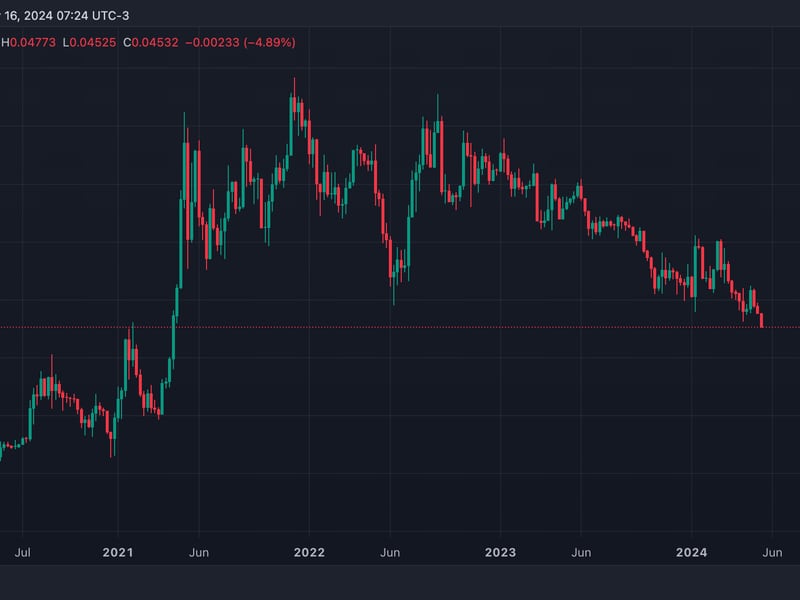UK’s Tech Bailout Could Help Blockchain Devs Weather COVID-19 Shutdown
Chainvine CEO Oliver Oram said COVID has thrashed his budget. “Everything has to be slashed at the moment because you don’t even know where normality will come back.” (Credit: Loveandrock / Shutterstock)
UK’s Tech Bailout Could Help Blockchain Devs Weather COVID-19 Shutdown
Britain’s tech startups are getting a tailor-made COVID-19 relief fund.
On Sunday, the UK government unveiled a £1.25 billion ($1.53 billion) rescue package for high-growth businesses, pledging £500 million in loans and £750 million in research funding to keep floundering startups afloat through the coronavirus pandemic. The new package is targeted at tech firms in particular, many of which were unable to tap a previous relief plan.
Blockchain platform startup Chainvine CEO Oliver Oram said his business, like countless other businesses in the UK and around the world, went into immediate crisis mode when economies began grinding to a halt earlier this year. Chainvine builds “frictionless trade” platforms that digitize import and export records for clients including the British government.
“‘We no longer have a budget,’” Oram recalled telling his 20-person team at the start of the crisis, “‘we just have costs.’”
Those costs had to go, and fast, Oram said. “It wasn’t a question of like, ‘OK we budget for this month.’ Everything has to be slashed at the moment because you don’t even know where normality will come back.”
Oram described the need to enact “draconian” belt-tightening measures after the pandemic interrupted Chainvine’s investment stream.
Some relief
“Future Fund,” the new convertible loan program, will run from May through September with 50/50 backing from taxpayers and the private sector. Loans from £125 thousand to £5 million will go to qualifying non-listed UK firms who have raised at least £250,000 from VCs in the past five years, according to the government fact sheet.
“The UK is a world leader in innovation and at this hugely challenging time, we know that young, fast-growing firms require tailored support to see them through,” UK’s Business Secretary Alok Sharma said in a press release that acknowledged that the government’s earlier funding effort, the Coronavirus Business Interruption Loan Scheme (CBILS), did not go far enough.
The new fund addresses some of the biggest tech-facing shortcomings of CBILS. That multi billion-pound small business bailout was seen as ill-suited to tech startups, many of whom said they failed to meet CBILS’ basic criteria and thus feared disaster from an economic crisis beyond their control.
Through petitions and open letters, tech firms rallied for a more inclusive funding scheme. Oram said part of CBILS’ problem was its reliance on commercial banks who could not properly value the “intangible assets” of tech startups.
I don’t think they’re equipped for that,” Oram told CoinDesk in an interview prior to the launch of “Future Fund.”
“Getting these loans then for a tech startup is even worse because these banks have no idea how to manage or value your intangible asset,” he said.
Better positioned
Chainvine furloughed seven developers, froze new projects, cut the management team’s pay, fired all nonessential-contractors and renegotiated terms with the rest, according to Oram.
He said he could not look to CBILS for help because Chainvine’s “intangible assets” were insufficient for the commercial bankers running that program. Bankers prefer brick and mortar collateral over fintech concepts, Oram said.
“At the moment it’s hard enough for banks to understand fintech and build fintech into their systems, let alone for a daily bank manager to actually value a fintech and decide what would be a fair or not fair loan.”
In a follow-up interview, Oram said that the Future Fund scheme is far better positioned to rescue high growth tech firms such as his. The program is run through the state’s British Business Bank, an economic development bank. Funding converts into equity if the loan is not paid back. Venture capital firms will match the taxpayer-backed loan, and extend more if needed.
“It’s a pretty good deal,” said Oram, who has not yet decided if Chainvine will apply. His chief financial officer is still reviewing the terms.
Oram said the new funding scheme is an encouraging public private partnership by a government which initially undervalued the importance of its tech ecosystem and whose first coronavirus relief program put much of Britain’s high-growth startup scene at risk.
“They’re beginning to realize that they can’t just let go of their intangible assets, their bright young startups that are coming up with solutions to tomorrow’s problems,” he said.
“I think there’s a general feeling that you can’t lose that talent, otherwise you’re going to lose it for years.”
Disclosure Read More
The leader in blockchain news, CoinDesk is a media outlet that strives for the highest journalistic standards and abides by a strict set of editorial policies. CoinDesk is an independent operating subsidiary of Digital Currency Group, which invests in cryptocurrencies and blockchain startups.









